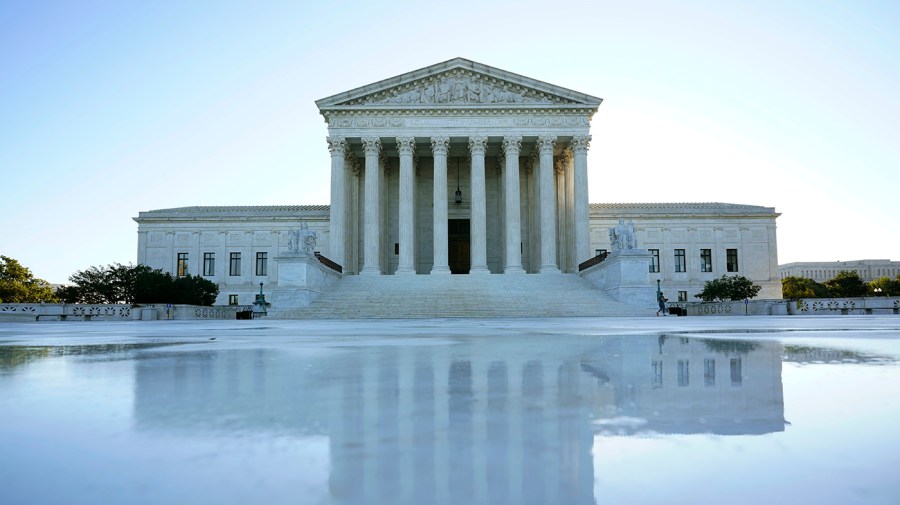Supreme Court won’t review school transgender bathroom policies
The Supreme Court let stand a lower court ruling allowing transgender students in Indiana to access school restrooms and locker rooms consistent with their gender identity Tuesday.
The justices in a brief order denied a request from a central Indiana school district to hear the case, which centers around a now-teenage transgender boy, identified in court documents as A.C., who was barred from using the boys restrooms at his former middle school.
The refusal to take up the case, which had no noted dissents, leaves unresolved a split among the nation’s federal appeals courts as to whether school districts are barred from enacting policies prohibiting transgender students from using bathrooms that align with their gender identity.
Transgender students have filed lawsuits across the country challenging their districts’ policies, contending they violate the 14th Amendment’s Equal Protection Clause and Title IX, the federal civil rights law prohibiting sex-based discrimination.
But the Supreme Court has shown a reluctance to wade into issues implicating transgender protections.
In 2021, the court similarly declined to weigh in on a transgender bathroom dispute. The justices last year declined to intervene to enforce West Virginia’s transgender athlete ban. And in June, the high court declined to disturb a ruling favoring a transgender woman who contested she was unlawfully deprived of her hormone treatment in jail.
Backed by 19 Republican state attorneys general as well as conservative and religious advocacy groups, the Metropolitan School District of Martinsville had hoped to use its case to convince the conservative-majority court that the time had come to step in.
“Not surprisingly in a diverse and divided nation, local jurisdictions have resolved this question differently,” wrote Paul Clement, a conservative legal heavyweight who represents the school district and has argued more than 100 cases before the Supreme Court.
“And not surprisingly in a litigious society, these disputes have made their way to federal courts. The federal courts have proven as divided as local school boards,” Clement told the justices.
More top stories from The Hill:
- New York high court denies Trump appeal of fraud case gag order
- House, Senate tax chiefs announce deal on business deductions, low-income credits
- DeSantis faces tough questions about his path forward
In a 2021 lawsuit filed on behalf of A.C. and his parents by the American Civil Liberties Union (ACLU) of Indiana, attorneys for the family argued that A.C., while a student at John R. Wooden Middle School, was “caused irreparable harm” after he was denied access to the boys restrooms and locker rooms.
School staff routinely referred to A.C. using female pronouns despite protest from his mother and stepfather, according to court documents, and a request for A.C. to join the boys soccer team was denied at least twice.
A federal judge in April 2022 granted A.C’s request for a preliminary injunction.
“The overwhelming majority of federal courts — including the Court of Appeals for the Seventh Circuit — have recently examined transgender education-discrimination claims under Title IX and concluded that preventing a transgender student from using a school restroom consistent with the student’s gender identity violates Title IX,” District Judge Tanya Walton Pratt wrote.
On appeal, A.C.’s case was consolidated with another challenge involving two transgender boys — identified in court documents as B.E. and S.E. — who similarly sued their Indiana school district after they were denied access to boys restrooms.
Each of the three boys has legally changed his name and amended his birth certificate to identify him as a boy.
In its August decision, a three-judge panel for the 7th U.S. Circuit Court of Appeals wrote that because the plaintiffs “appear to be boys in the eyes of the State of Indiana … then it would be contrary to Indiana law for the school districts to treat A.C., B.E., and S.E. as though they are not boys and to require them to use the girls’ bathrooms and locker rooms.”
The boys are likely to succeed on their claims of sex discrimination, the panel wrote, but added that the Supreme Court is likely to intervene.
“Litigation over transgender rights is occurring all over the country, and we assume that at some point the Supreme Court will step in with more guidance than it has furnished so far,” the panel wrote at the time.

(AP Photo/J. Scott Applewhite)
But A.C., represented by his mother because he is a minor, contended that the Supreme Court had no jurisdiction to hear the appeal. A.C. has graduated from middle school, making the lower ruling at issue moot, he argued.
“There are no facts in the record about A.C.’s or other transgender students’ use of the restrooms in the high school A.C. now attends, beyond the fact that some transgender students are allowed to use restrooms associated with their gender identity on a case-by-case basis,” the ACLU of Indiana wrote in court filings.
At least nine states have enacted laws or policies that bar transgender people from using facilities consistent with their gender identity in K-12 schools, according to the Movement Advancement Project, a nonprofit group that tracks LGBTQ laws. Attempts by Indiana lawmakers to pass similar legislation were thwarted by Democrats in each of the last two legislative sessions.
Copyright 2023 Nexstar Media Inc. All rights reserved. This material may not be published, broadcast, rewritten, or redistributed. Regular the hill posts







